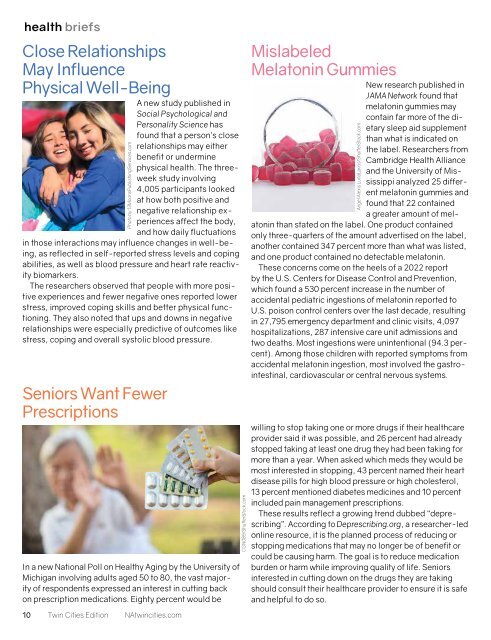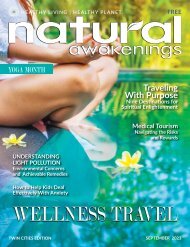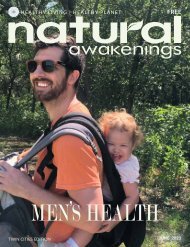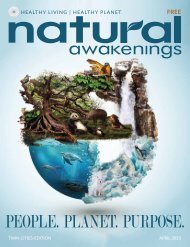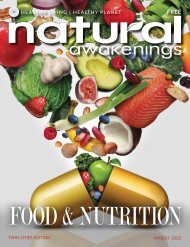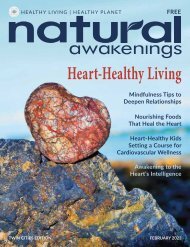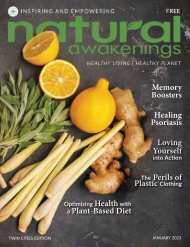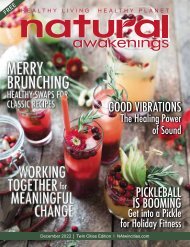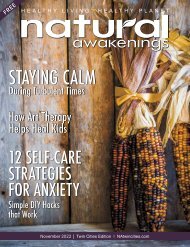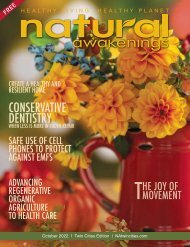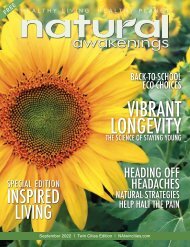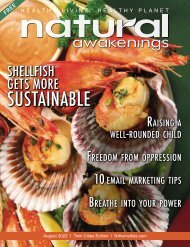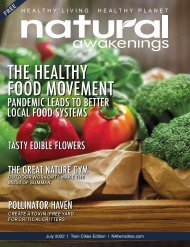Natural Awakenings Twin Cities July 2023
Read the July 2023 edition of Natural Awakenings Twin Cities magazine. This is our annual Food Connection Issue which features articles on eating healthy and minimizing food waste, regenerative techniques for a healthy ecosystem, benefits of a colorful diet, gut health for kids, microbiome connection, fighting climate change in the garden, and so much more! Be sure to check out our local content, including News Brief announcements, Community Resource Guide with providers throughout the metro who can meet your individual wellness needs, and all the happenings in the Calendar of Events. There is additional online-only content that can be found at NATwinCities.com.
Read the July 2023 edition of Natural Awakenings Twin Cities magazine. This is our annual Food Connection Issue which features articles on eating healthy and minimizing food waste, regenerative techniques for a healthy ecosystem, benefits of a colorful diet, gut health for kids, microbiome connection, fighting climate change in the garden, and so much more!
Be sure to check out our local content, including News Brief announcements, Community Resource Guide with providers throughout the metro who can meet your individual wellness needs, and all the happenings in the Calendar of Events. There is additional online-only content that can be found at NATwinCities.com.
You also want an ePaper? Increase the reach of your titles
YUMPU automatically turns print PDFs into web optimized ePapers that Google loves.
health briefs<br />
Close Relationships<br />
May Influence<br />
Physical Well-Being<br />
A new study published in<br />
Social Psychological and<br />
Personality Science has<br />
found that a person’s close<br />
relationships may either<br />
benefit or undermine<br />
physical health. The threeweek<br />
study involving<br />
4,005 participants looked<br />
at how both positive and<br />
negative relationship experiences<br />
affect the body,<br />
and how daily fluctuations<br />
in those interactions may influence changes in well-being,<br />
as reflected in self-reported stress levels and coping<br />
abilities, as well as blood pressure and heart rate reactivity<br />
biomarkers.<br />
The researchers observed that people with more positive<br />
experiences and fewer negative ones reported lower<br />
stress, improved coping skills and better physical functioning.<br />
They also noted that ups and downs in negative<br />
relationships were especially predictive of outcomes like<br />
stress, coping and overall systolic blood pressure.<br />
Seniors Want Fewer<br />
Prescriptions<br />
10 <strong>Twin</strong> <strong>Cities</strong> Edition NAtwincities.com<br />
Photo by 13MoonsPublishingServices.com<br />
In a new National Poll on Healthy Aging by the University of<br />
Michigan involving adults aged 50 to 80, the vast majority<br />
of respondents expressed an interest in cutting back<br />
on prescription medications. Eighty percent would be<br />
CGN089/ShutterStock.com<br />
Mislabeled<br />
Melatonin Gummies<br />
New research published in<br />
JAMA Network found that<br />
melatonin gummies may<br />
contain far more of the dietary<br />
sleep aid supplement<br />
than what is indicated on<br />
the label. Researchers from<br />
Cambridge Health Alliance<br />
and the University of Mississippi<br />
analyzed 25 different<br />
melatonin gummies and<br />
Angel Alexis LunaLarios/ShutterStock.com<br />
found that 22 contained<br />
a greater amount of melatonin<br />
than stated on the label. One product contained<br />
only three-quarters of the amount advertised on the label,<br />
another contained 347 percent more than what was listed,<br />
and one product contained no detectable melatonin.<br />
These concerns come on the heels of a 2022 report<br />
by the U.S. Centers for Disease Control and Prevention,<br />
which found a 530 percent increase in the number of<br />
accidental pediatric ingestions of melatonin reported to<br />
U.S. poison control centers over the last decade, resulting<br />
in 27,795 emergency department and clinic visits, 4,097<br />
hospitalizations, 287 intensive care unit admissions and<br />
two deaths. Most ingestions were unintentional (94.3 percent).<br />
Among those children with reported symptoms from<br />
accidental melatonin ingestion, most involved the gastrointestinal,<br />
cardiovascular or central nervous systems.<br />
willing to stop taking one or more drugs if their healthcare<br />
provider said it was possible, and 26 percent had already<br />
stopped taking at least one drug they had been taking for<br />
more than a year. When asked which meds they would be<br />
most interested in stopping, 43 percent named their heart<br />
disease pills for high blood pressure or high cholesterol,<br />
13 percent mentioned diabetes medicines and 10 percent<br />
included pain management prescriptions.<br />
These results reflect a growing trend dubbed “deprescribing”.<br />
According to Deprescribing.org, a researcher-led<br />
online resource, it is the planned process of reducing or<br />
stopping medications that may no longer be of benefit or<br />
could be causing harm. The goal is to reduce medication<br />
burden or harm while improving quality of life. Seniors<br />
interested in cutting down on the drugs they are taking<br />
should consult their healthcare provider to ensure it is safe<br />
and helpful to do so.


